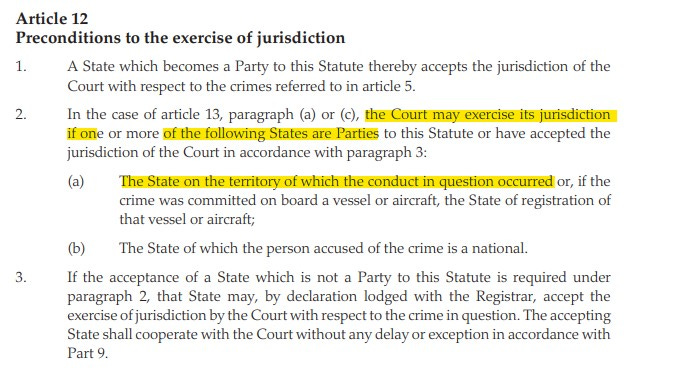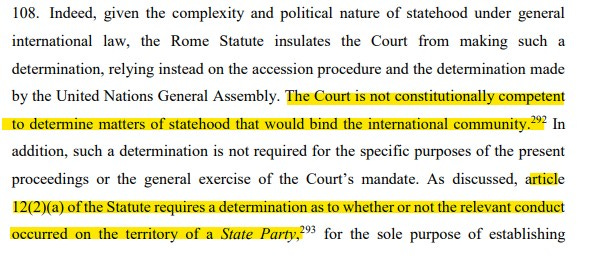Why no warrant for the PM of Palestine? ICC wants its cake and eat it
Warrants were issued for the PM of one country but not the other. Why are no warrants issued for the Prime Minister of the State of Palestine? Could it be that the ICC is adopting different standards?
On November 21st, 2024, the ICC issued warrants for war crimes that allegedly occurred in Gaza by Israelis and for crimes that occurred in Israel by Gazans. 1
Warrants were issued for the Israeli Prime Minister and then Minister of Defense, however, no warrants were issued for their counterparts of the State of Palestine, despite the fact that Gaza was held to be part of the territory of the State of Palestine.
By issuing warrants for ministers of Israel, but not for ministers of Palestine, the ICC has shown itself to be operating by double standards, or, more likely, to be operating under a legal fiction that Gaza is part of the territory of the State of Palestine. Its omission - not issuing warrants for senior ministers of Palestine - contradict that claim.
What is jurisdiction?
Jurisdiction is the power of a court to hear a case. Without jurisdiction, a court cannot hear a case. It is very important, therefore, that a court satisfies itself that it has jurisdiction before it can consider the merits of a case.
Jurisdiction can be limited in time (limitations), space (territorial jurisdiction) and subject matter (e.g., a family court has no jurisdiction to hear a contract dispute). Any limitation on the power of a court to hear a case is a limitation on its jurisdiction.
The alleged crimes for which PM Netanyahu and then Defense Minister Gallant were charged are set out in a press release issued by the ICC. They include using starvation as a weapon of war. I am not concerned with the substance of the allegations here. If jurisdiction fails, the ICC cannot try the case and that is the end of the matter.
ICC claims jurisdiction over Israel
There are two issues in determining whether or not the ICC has jurisdiction over Israel:
Did the conduct in question occur in the territory of a State Party to the treaty which governs the ICC; and
Is there a ‘delegation’ issue limiting the power of the ICC to prosecute Israeli citizens.
I will deal with the first issue here. The question of delegation is the subject of another article.
The ICC is established by a treaty known as The Rome Statute. Article 25 provides for the prosecution of individuals for war crimes.
Under normal circumstances, the ICC only has jurisdiction over parties to the treaty. ‘The State of Palestine’ acceded to the treaty in 2015 and so the ICC has jurisdiction over ‘The State of Palestine’.
Israel is not a party to the treaty. Under the Statute, the ICC can only have jurisdiction over citizens of Israel if Israel accedes to the jurisdiction of the court, or, if the territorial requirement of Art. 12(2) is satisfied.
Article 12 allows the court to exercise jurisdiction against a citizen of a non-treaty State, such as Israel, if the ‘conduct in question’ occurred ‘on the territory’ of one of the States which is a Party to the treaty. So the court can exercise jurisdiction and issue warrants against a citizen of Israel if the alleged criminal conduct of an Israeli citizen occurred within ‘The State of Palestine’. The question thus becomes, ‘What is the territory of the State of Palestine?’
Is Gaza ‘territory’ within ‘the State of Palestine’?
The alleged conduct in question, including using starvation as a weapon of war, occurred in Gaza. The first issue for jurisdiction is whether Gaza is ‘the territory’ of ‘the State of Palestine’ for the purposes of the Statute? If Gaza is within the State of Palestine, the ICC has prima facie jurisdiction over Israeli citizens.
On February 5th, 2021, the Pre-trial Chamber of the ICC addressed this question.
The court made it clear that it did not need to determine whether or not Palestine is a state. All it needed to do was determine whether territory on which alleged conduct occurred was the territory of Palestine.
The court then goes to define its territorial jurisdiction according to UN GA Resolution 67/18, which provides, in Article 1:
This is circular reference: ‘in Palestine … on Palestinian territory’. The resolution does not define ‘Palestinian territory’.
The court cites this highlighted phrase:
The court then interprets ‘on the Palestinian territory’ to mean ‘all of the territory occupied by Israel since 1967’:
Here the court is equating “Palestinian territories occupied by Israel since 1967” with “[all of] the Palestinian territory occupied by Israel since 1967” and so claims jurisdiction over conduct alleged to have occurred in Gaza.
Are these two phrases saying the same things? Paragraph 118, quoted above, is a leap in the dark. UN Resolution 67/19 says nothing about the definition of the territory of ‘their State of Palestine’, let alone that it comprises all of the territories occupied since 1967. On the contrary, Article 4 confirms that the State of Palestine is a vision.
Resolution 67/19 merely refers to ‘the Palestinian territory occupied since 1967’ without specifying what that territory is. Is it all the territory occupied since 1967 or is it some of the territory as agreed in the Oslo Accords?
It certainly is not clear from Res 67/19 that the “Palestinian territory occupied by Israel since 1967” comprises all of the territory occupied by Israel since 1967. However, the more compelling question is whether the ICC is acting on its own pronouncement.
The elephant in the room
Assuming Gaza is part of The State of Palestine for purposes of the territorial jurisdiction of the ICC, then we have a curious anomaly. Crimes were allegedly committed by individuals of Israel in Gaza, and separately, on October 7th and after, 2023, by individuals of Gaza invading, allegedly committing the crime of extermination and taking hostages from Israel to Gaza. If Gaza is part of Palestine for jurisdictional purposes, as the court holds, then we have alleged crimes committed by Israeli citizens in Palestine, and alleged crimes committed by Palestinian civilians in Israel and Palestine. 2
In the case of Israel, we find warrants issued for the Prime Minister Netanyahu and the then Defense Minister Gallant, but in the case of Palestine, we only find warrants issued for three senior leaders of Hamas,
Ismail Haniyeh, Chairman of Hamas Political Bureau
Yahya Sinwar , leader of Hamas; and
Mohammed Diab Ibrahim Al-Masri, commonly known as ‘Deif’, military leader of Hamas.
No warrants were issued for leaders of Palestine; in particular, no warrant was issue for the Prime Minister of Palestine, Mohammad Mustafa, the counterpart of Israeli Prime Minister Netanyahu.
This is somewhat puzzling. Why was a warrant issued for the Prime Minister of one state accused of war crimes but not for the other? Let’s review the provision of the Rome Statute that allows for pinpointing such officials:
Article 25 (3) (d) casts a very wide purview of liability: “In any other way contributes to the commission of … a crime. Such contribution shall be made in the knowledge of the intention of the group to commit the crime.”
So the ICC is telling us that a part of the State of Palestine, Gaza, invades Israel on October 7th and brings back hostages, but this was done without the contribution or knowledge of the Prime Minister of Palestine?
This is curious, indeed. Surely, if one country invades another, the Prime Minister of that country should be aware of the fact in advance and have some say over the matter. The obvious conclusion is that either,
A warrant should be issued for the Prime Minister of Palestine and his minister of interior; or
Gaza is not a part of Palestine, despite the “vision and hope” of UN GA Resolution 67/19.
If the latter, and Gaza is not part of The State of Palestine, then the ICC has no jurisdiction over acts committed by Israel in Gaza and should immediately withdraw its warrants. Any claim by the ICC to have territorial jurisdiction over Gaza as part of Palestine is inconsistent with its actions in pursuing warrants for members of Hamas, and only Hamas, rather than senior members of the State of Palestine.
Issuing warrants for Hamas leaders, and not leaders of the The State of Palestine, indicates that Gaza is a separate state for purposes of jurisdiction and not part of The State Palestine. This inference would conform with reality: in 2007 Hamas kicked the Palestinian Authority out of Gaza. Since then, it had its own government structure with the following ministries:
Ministry of Interior: Oversees internal security, police forces, and civil defense.
Ministry of Health: Manages public health services, hospitals, and medical facilities.
Ministry of Education: Responsible for primary and secondary education systems.
Ministry of Higher Education: Oversees universities and higher education institutions.
Ministry of Social Development: Provides social services and support to vulnerable populations.
Ministry of Public Works and Housing: Handles infrastructure development and housing projects.
Ministry of Agriculture: Manages agricultural policies and supports farmers.
Ministry of Economy: Oversees economic policies, trade, and industry.
Ministry of Finance: Manages fiscal policies, budgeting, and public expenditures.
Ministry of Justice: Oversees the legal system and judicial affairs.
Ministry of Labor: Responsible for employment policies and labor relations.
Ministry of Transportation: Manages transportation infrastructure and services.
Ministry of Telecommunications and Information Technology: Oversees communication services and IT infrastructure.
Ministry of Tourism and Antiquities: Manages cultural heritage sites and promotes tourism.
The elephant in the room is the fact that Gaza is a de facto state, with at least three of the criteria of the Montevideo Convention3, separate from the the Palestinian Authority, which represents the State of Palestine, and which was kicked out of Gaza by Hamas in 2007. There has been no formal connection between Gaza and the State of Palestine since that year. This state of affairs is evidenced by the Beijing Declaration of July 2024, which aims to reconcile Hamas and Fatah, which controls the Palestinian authority, as well as twelve other Palestinian factions.
This Declaration presupposes that Gaza has no current relationship with either the PLO, Fatah, or the Palestinian Authority, which represent the State of Palestine.
The idea that the de facto state of Gaza is part of the State of Palestine is absurd and the ICC extending its jurisdiction to include conduct that occurred in Gaza is a legal nonsense. The ICC should either issue warrants for the leadership of the State of Palestine or withdraw its warrants for the conduct of Israeli citizens in the de facto state of Gaza. The ICC can’t have its cake and eat it.
Warrants were issued for Israeli PM Netanyahu and former defense minister Gallant. Warrants were requested for three senior Hamas leaders: Ismail Haniyeh, Yahya Sinwar and Mr Mohammed Diab Ibrahim Al-Masri, alias ‘Deif’, but only the warrant for Deif was issued, the other two requests were withdrawn after the accused were confirmed dead. https://www.icc-cpi.int/news/situation-state-palestine-icc-pre-trial-chamber-i-issues-warrant-arrest-mohammed-diab-ibrahim
The actual invasion and massacre of October 7th did not occur on the territory of a State Party, but if Gaza is part of the State of Palestine, the ICC would have jurisdiction over nationals of Gaza for such crimes under Art 12(2)(b), cited above.
Article 1 of the Montevideo Convention gives the criteria for a state:
A permanent population,
A defined territory,
A government, and
The capacity to enter into relations with other state.
https://www.ilsa.org/Jessup/Jessup15/Montevideo%20Convention.pdf
Gaza easily satisfies the first three criteria. In "The Creation of States in International Law”, James Crawford claims that the fourth criterion of the Montevideo Convention is largely redundant. Crawford contends that the first three criteria already imply the capacity for international relations.


















And who is the PM of Palestine and what is he accused of? (The cake looks nice).